Fleurs du Mal Magazine


Or see the index
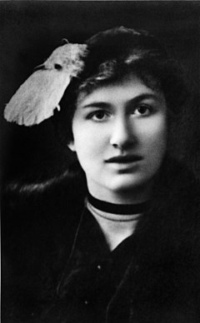
Edith Södergran
(1892-1923)
Mitt liv, min död och mitt öde
Jag är ingenting än en omätlig vilja,
en omätlig vilja, men vartill, vartill?
Allting är mörker omkring mig,
jag kan ej lyfta ett halmstrå.
Min vilja vill blott ett, men detta känner icke jag.
När min vilja bryter fram, skall jag dö:
var hälsad mitt liv, min död och mitt öde.
Edith Södergran poetry
fleursdumal.nl magazine
More in: Edith Södergran, Södergran, Edith
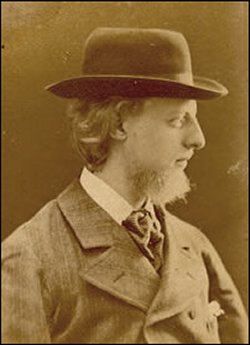
Jacques Perk
(1859-1881)
O, noodlot!
Wie naar ons staren, staren naar ons beiden,
Als waren wij gelukkig en verloofd;
Men ziet ons aan, en wenkt met oog en hoofd,
En wil ons vreugd door wedervreugd bereiden.
Mathilde! ik zou u nimmer kunnen leiden
Door ‘t leven! ‘t Noodlot, dat gij wijs gelooft,
Scheidt mij van u, die mijn verdriet me ontrooft
En vroolijk hart…. Ik k…n niet van u scheiden….
En tòch, die Macht, die over ‘t menschdom waakt,
Is wijs, en doet mij wijslijk u verlaten,
Omdat, hoog wezen! Gij me een onding maakt!
Ik leef in ú, en denk en doe als gij,
Ik ga mijzelf, zooals ik nú ben, haten –
Tot dweper, tot een jonkvrouw maakt gij mij…!
(Mathilde – Een Sonnettenkrans in vier boeken – XXVI)
Jacques Perk gedicht
• fleursdumal.nl magazine
More in: Archive O-P, CLASSIC POETRY, Jacques Perk
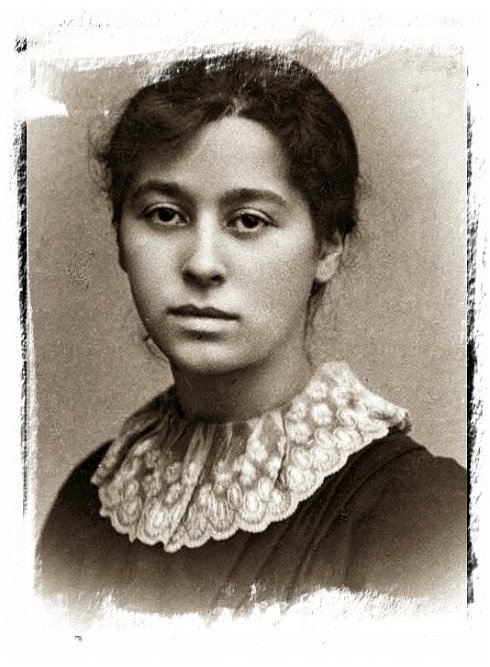
Amy Levy
(1861-1889)
A Greek Girl
I may not weep, not weep, and he is dead.
A weary, weary weight of tears unshed
Through the long day in my sad heart I bear;
The horrid sun with all unpitying glare
Shines down into the dreary weaving-room,
Where clangs the ceaseless clatter of the loom,
And ceaselessly deft maiden-fingers weave
The fine-wrought web; and I from morn till eve
Work with the rest, and when folk speak to me
I smile hard smiles; while still continually
The silly stream of maiden speech flows on:–
And now at length they talk of him that’s gone,
Lightly lamenting that he died so soon–
Ah me! ere yet his life’s sun stood at noon.
Some praise his eyes, some deem his body fair,
And some mislike the colour of his hair!
Sweet life, sweet shape, sweet eyes, and sweetest hair,
What form, what hue, save Love’s own, did ye wear?
I may not weep, not weep, for very shame.
He loved me not. One summer’s eve he came
To these our halls, my father’s honoured guest,
And seeing me, saw not. If his lips had prest
My lips, but once, in love; his eyes had sent
One love-glance into mine, I had been content,
And deemed it great joy for one little life;
Nor envied other maids the crown of wife:
The long sure years, the merry children-band–
Alas, alas, I never touched his hand!
And now my love is dead that loved not me.
Thrice-blest, thrice-crowned, of gods thrice-lovèd she–
That other, fairer maid, who tombward brings
Her gold, shorn locks and piled-up offerings
Of fragrant fruits, rich wines, and spices rare,
And cakes with honey sweet, with saffron fair;
And who, unchecked by any thought of shame,
May weep her tears, and call upon his name,
With burning bosom prest to the cold ground,
Knowing, indeed, that all her life is crown’d,
Thrice-crowned, thrice honoured, with that love of his;–
No dearer crown on earth is there, I wis.
While yet the sweet life lived, more light to bear
Was my heart’s hunger; when the morn was fair,
And I with other maidens in a line
Passed singing through the city to the shrine,
Oft in the streets or crowded market-place
I caught swift glimpses of the dear-known face;
Or marked a stalwart shoulder in the throng;
Or heard stray speeches as we passed along,
In tones more dear to me than any song.
These, hoarded up with care, and kept apart,
Did serve as meat and drink my hungry heart.
And now for ever has my sweet love gone;
And weary, empty days I must drag on,
Till all the days of all my life be sped,
By no thought cheered, by no hope comforted.
For if indeed we meet among the shades,
How shall he know me from the other maids?–
Me, that had died to save his body pain!
Alas, alas, such idle thoughts are vain!
O cruel, cruel sunlight, get thee gone!
O dear, dim shades of eve, come swiftly on!
That when quick lips, keen eyes, are closed in sleep,
Through the long night till dawn I then may weep.
Amy Levy poetry
fleursdumal.nl magazine
More in: Amy Levy, Archive K-L, Levy, Amy

Edith Södergran
1892-1923
Skönhet
Vad är skönhet? Fråga alla själar –
skönhet är varje överflöd, varje glöd, varje överfyllnad och varje stort armod;
skönhet är att vara sommaren trogen och naken intill hösten;
skönhet är papegojans fjäderskrud eller solnedgången som bebådar storm;
skönhet är ett skarpt drag och ett eget tonfall: det är jag,
skönhet är en stor förlust och ett tigande sorgetåg,
skönhet är solfjäderns lätta slag som väcker ödets fläkt;
skönhet är att vara vällustig som rosen eller att förlåta allting för att solen skiner;
skönhet är korset munken valt eller pärlbandet damen får av sin älskare,
skönhet är icke den tunna såsen i vilken diktare servera sig själva,
skönhet är att föra krig och söka lycka,
skönhet är att tjäna högre makter.
Edith Södergran poetry
fleursdumal.nl magazine
More in: Edith Södergran, Södergran, Edith

Edith Södergran
(1892-1923)
Månen
Vad allting som är dött är underbart
och outsägligt:
ett dött blad och en död människa
och månens skiva.
Och alla blommor veta en hemlighet
och skogen den bevarar,
det är att månens kretsgång kring vår jord
är dödens bana.
Och månen spinner sin underbara väv,
den blommor älska,
och månen spinner sitt sagolika nät
kring allt som lever.
Och månens skära mejar blommor av
i senhöstnätter,
och alla blommor vänta på månens kyss
i ändlös längtan.
(1922)
Der Mond
Wie wundersam ist alles Tote
wie unaussprechlich:
ein totes Blatt, ein toter Mensch
des Mondes Scheibe.
Und alle Blumen kennen ein Geheimnis
welches der Wald bewahrt:
des Mondes Kreisumlauf um unsre Erde
ist des Todes Bahn.
Und der Mond spinnt sein Gewebe wundersam
welches die Blumen lieben,
und der Mond spinnt sein Märchennetz
um alles Lebende.
Und des Mondes Sichel mäht Blumen ab
in Spätherbstnächten,
und alle Blumen warten auf des Mondes Kuß
in endlosem Verlangen.
Edith Södergran poetry
fleursdumal.nl magazine
More in: Edith Södergran, Södergran, Edith
![]()
Front 242 singer and Psy’Aviah
bring an Arthur Rimbaud poem on music
Electronic band Psy’Aviah and electronic pioneer Jean-Luc De Meyer (known from the cult 80s band Front 242) have collaborated on a track called “Ophélie”, based on the poem by Arthur Rimbaud. Jean-Luc De Meyer sings the poem in the original language.
Watch the small teaser clip: http://www.youtube.com/watch?v=2Tb0LEDIr8E
The track appears on their new album “Eclectric” which is released by Alfa Matrix records. Psy’Aviah has a tradition in inviting guests to the album, and this isn’t the first poem they brought. In 2007 they even reach the top 20 of the international BBC Next Big Thing contest with the track Moments featuring poet Suzi Q. Smith.
More info at www.psyaviah.com

fleursdumal.nl magazine
More in: Archive Q-R, Art & Literature News, Arthur Rimbaud, Rimbaud, Arthur
.jpg)
Amy Levy
(1861-1889)
A March Day in London
The east wind blows in the street to-day;
The sky is blue, yet the town looks grey.
‘Tis the wind of ice, the wind of fire,
Of cold despair and of hot desire,
Which chills the flesh to aches and pains,
And sends a fever through all the veins.
From end to end, with aimless feet,
All day long have I paced the street.
My limbs are weary, but in my breast
Stirs the goad of a mad unrest.
I would give anything to stay
The little wheel that turns in my brain;
The little wheel that turns all day,
That turns all night with might and main.
What is the thing I fear, and why?
Nay, but the world is all awry–
The wind’s in the east, the sun’s in the sky.
The gas-lamps gleam in a golden line;
The ruby lights of the hansoms shine,
Glance, and flicker like fire-flies bright;
The wind has fallen with the night,
And once again the town seems fair
Thwart the mist that hangs i’ the air.
And o’er, at last, my spirit steals
A weary peace ; peace that conceals
Within its inner depths the grain
Of hopes that yet shall flower again.
Amy Levy poetry
fleursdumal.nl magazine
.jpg)
Delmira Agustini
(1886-1914)
El Nudo
Su idilio fue una larga sonrisa a cuatro labios…
En el regazo cálido de rubia primavera
Amáronse talmente que entre sus dedos sabios
Palpitó la divina forma de la Quimera.
En los palacios fúlgidos de las tardes en calma
Hablábanse un lenguaje sentido como un lloro,
Y se besaban hondo hasta morderse el alma!…
Las horas deshojáronse como flores de oro,
Y el Destino interpuso sus dos manos heladas…
Ah! los cuerpos cedieron, mas las almas trenzadas
Son el más intrincado nudo que nunca fue…
En lucha con sus locos enredos sobrehumanos
Las Furias de la vida se rompieron las manos
Y fatigó sus dedos supremos Ananké…
Delmira Augustini poetry
fleursdumal.nl magazine
More in: Agustini, Delmira, Delmira Agustini
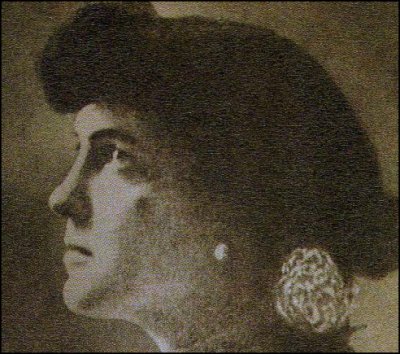
Delmira Agustini
(1886-1914)
El Poeta Y La Ilusion
La princesita hipsipilo, la vibrátil filigrana,
—Princesita ojos turquesas esculpida en porcelana—
Llamó una noche a mi puerta con sus manitas de lis.
Vibró el cristal de su voz como una flauta galana.
—Yo sé que tu vida es gris.
Yo tengo el alma de rosa, frescuras de flor temprana,
Vengo de un bello país
A ser tu musa y tu hermana!—
Un abrazo de alabastro…luego en el clavel sonoro
De su boca, miel suavísima; nube de perfume y oro
La pomposa cabellera me inundó como un diluvio.
O miel, frescuras, perfumes!…Súbito el sueño, la sombra
Que embriaga..Y, cuando despierto, el sol que alumbra en mi alfombra
Un falso rubí muy rojo y un falso rizo muy rubio!
Delmira Augustini poetry
fleursdumal.nl magazine
More in: Agustini, Delmira, Archive A-B, Delmira Agustini

Alice De Chambrier
(1861-1882)
Chanson Du Soir
Sur nos fronts déployant ses ailes,
La nuit aux yeux rêveurs étend
Son voile émaillé d’étincelles
Comme la robe d’un sultan.
Le lac enveloppe ses grèves
D’un long baiser rempli d’amour:
Le monde s’abandonne aux rêves
Qui naissent au déclin du jour.
L’âme s’envole sur la trace
D’un nuage au reflet vermeil,
Qui fuit tout joyeux dans l’espace
A la poursuite du soleil.
Elle franchit les monts tranquilles,
Qui vont songeurs dans l’infini
Perdre leurs sommets immobiles
Où les grands aigles font leur nid.
Elle sourit aux vertes plaines
Où paissent les troupeaux joyeux,
Écoute les chansons lointaines
Qui montent dans l’azur des cieux;
Elle se penche sur les rives
Des grands fleuves au bord glissant,
Et dont les ondes fugitives
A l’inconnu vont en dansant;
Elle effleure les sombres plages
Où, contre les rochers géants,
Viennent avec des cris sauvages
Mourir les flots des océans;
Elle erre sur les forêts vierges,
Passe au-dessus des hauts palmiers
Dont les troncs droits semblent les cierges
D’un temple aux immenses piliers….
Et, quittant les terres connues,
Elle s’en va, d’un seul élan,
Au delà des rapides nues,
Dans le grand ciel étincelant.
Puis elle s’arrête, indécise,
Croyant reconnaître, égaré
Dans un murmure de la brise,
Un timbre de voix adoré….
Doux souvenir d’êtres qu’elle aime,
Partis pour des lieux inconnus,
Et qui, depuis l’heure suprême,
Ne sont, hélas! pas revenus!…
Et l’âme, triste, se réveille,
Frissonnant dans l’ombre du soir:
Le nuage à l’aile vermeille
A disparu dans le ciel noir…
1880
Alice De Chambrier poetry
Chanson Du Soir
• fleursdumal.nl magazine
.jpg)
More in: Alice De Chambrier, Archive C-D, Chambrier, Alice De
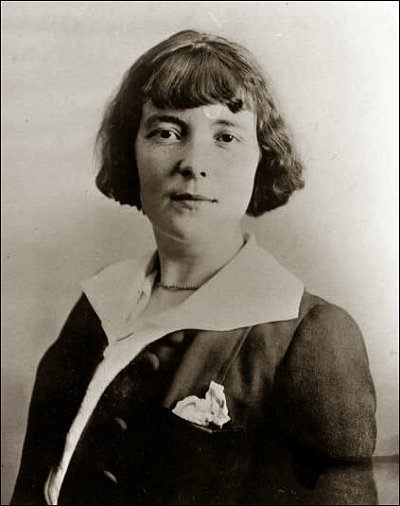
Katherine Mansfield
(1888-1923)
The Black Monkey
My Babbles has a nasty knack
Of keeping monkeys on her back.
A great big black one comes and swings
Right on her sash or pinny strings.
It is a horrid thing and wild
And makes her such a naughty child.
She comes and stands beside my chair
With almost an offended air
And says:—”Oh, Father, why can’t I?”
And stamps her foot and starts to cry—
I look at Mother in dismay…
What little girl is this, to-day?
She throws about her nicest toys
And makes a truly dreadful noise
Till Mother rises from her place
With quite a Sunday churchy face
And Babbles silently is led
Into the dark and her own bed.
Never a kiss or one Goodnight,
Never a glimpse of candle light.
Oh, how the monkey simply flies!
Oh, how poor Babbles calls and cries,
Runs from the room with might and main,
“Father dear, I am good again.”
When she is sitting on my knee
Snuggled quite close and kissing me,
Babbles and I, we think the same—
Why, that the monkey never came
Only a terrible dream maybe…
What did she have for evening tea?
Katherine Manfield poetry
fleursdumal.nl m a g a z i n e
More in: Katherine Mansfield, Mansfield, Katherine
.jpg)
Amy Levy
(1861-1889)
A London Plane-Tree
Green is the plane-tree in the square,
The other trees are brown;
They droop and pine for country air;
The plane-tree loves the town.
Here from my garret-pane, I mark
The plane-tree bud and blow,
Shed her recuperative bark,
And spread her shade below.
Among her branches, in and out,
The city breezes play;
The dun fog wraps her round about;
Above, the smoke curls grey.
Others the country take for choice,
And hold the town in scorn;
But she has listened to the voice
On city breezes borne.
Amy Levy poetry
fleursdumal.nl magazine
Thank you for reading Fleurs du Mal - magazine for art & literature